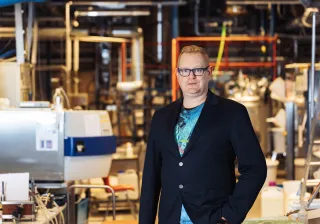Welcome to the Future Perspectives blog series exploring the role of technology in society!
The divide between sciences and the humanities has been described by some as the major culture war of our time. While the most fervent proponents of science as a be-all-end-all approach to understanding the world might not agree, we argue that it is absolutely critical to integrate natural sciences, social sciences and the humanities.
Science can provide us some answers about the fundamental nature of objective reality but nothing about our subjective and intersubjective realities. Science can tell us something about what is true, but nothing about what is good and beautiful. This, perhaps, is the most fundamental argument on why we need social sciences and the humanities especially in the context of technological innovation.
It is also naive to think that the scientific method is somehow immune to whatever is the dominant cultural context. Culture directly affects our assumptions about what is worth paying attention to at any given moment. When Francis Bacon, the grandfather of the scientific method, urged us to “to conquer and subdue (nature)… to shake her to her foundations… to bind her to your service and make her your slave” (Science and poetry, Mary Midgley (2006), p. 56) There is nothing “scientific” about these statements any more than Richard Dawkins’ notion of genes being “selfish” (and somehow more fundamental than other emergent organisms or phenomena) is scientific. This kind of atomistic view has major implications on how we think about reality. This is not science talking - it is the humanities (or perhaps a lack thereof).
Certainly, modern day physics has moved beyond conceiving reality in an atomistic way, or of conceiving nature as something we can fully control: we no longer believe that there are some fundamental building blocks (e.g., atoms, quarks or genes) that are somehow more fundamental than other stuff. However, this atomistic philosophy is still very much alive in our dominant mechanistic, linear and reductionist way of picking apart wholes into its constitutive parts and envisioning isolated solutions to isolated problems.
If Science can’t tell us anything about what is desirable (the Good and the Beautiful), what then is it that drives scientific or technological progress? What research gets funded and what innovations are “investable”? A provocative answer would be: Whatever wins short term. In the absence of humanities, the technology that provides short-term gain and competitive advantage is what gets developed and applied. Whenever this is the case, we are likely to keep on driving races to the bottom, where we optimize for narrow short-term metrics while causing harm elsewhere in the system.
As technology (think applied science) affects every aspect of our lives as both individuals and societies, it follows that a scientific (think techno-centric) approach alone is not feasible long term. We go on to argue that multiple perspectives are needed to work towards a desirable future. As we engage in increasingly difficult questions about what a desirable future state is, what kind of society we want to live in, or most fundamentally, what is a meaningful human life? We will not get far without incorporating philosophy, ethics and aesthetics into the “equation”.
Within the sciences, there is a further divide between natural sciences and social sciences. The natural science camp is quick to criticize social sciences for ambiguity and not isolating oneself from the research question, for working with small data sets, too homogenous samples and studies that fail the test of time. (“So, you are basically working with noise?” I witnessed a computer science professor blurb to a sociology professor last week in a workshop. The other camp is convinced that natural sciences are of little use in understanding or predicting social behavior and understanding the nature of problem instead of trying to provide a targeted but narrow-focus solution (which seems to be increasingly incorrect, as complexity sciences and related fields mature). However, numerous historical endeavors have indeed steered us towards rather dystopian trajectories. For instance, consider social Darwinism morphing into laissez-faire economics, or the prolonged overshoot in attempting to render psychology more "scientific" through the lens of behaviorism over the course of a century.
Since the spring of 2022, we have been actively engaged in renewing the VTT iBEX innovation programme, and we have personally witnessed this phenomenon. The distinction between social sciences and natural sciences was readily apparent from the initial round of VTT iBEX applications. On one side, teams with a social science orientation tended to downplay the significance of technology in their proposals. It's not that technology holds intrinsic value, but as we'll consistently argue in this blog series: any theory of change that neglects technology is unlikely to have a substantial impact on the future!
On the flip side, applicants leaning towards natural sciences were somewhat indifferent to the political-economic dynamics that could potentially impose limitations on their solutions. Even worse, they may have overlooked the potential adverse psycho-social consequences of their approaches.
In order to bridge this gap, we took the step of integrating teams from both perspectives and entrusting project management responsibilities to those who displayed a keener interest in social sciences and the humanities. Throughout the project, we will encourage teams to consider alternative viewpoints from both the sciences and the humanities.
By Katri Kallio,Thomas Holm and Maija Salonen-Ojaranta
Katri Kallio is Lead of Futures at VTT. Her current focus is on developing VTT's strategic foresight capability towards more holistic approach. She is a learning professional who aims to strengthen dialogue and mutual understanding of the constant change of the world and what requirements it sets for development of technologies and innovations.
Thomas Holm is the co-founder of Leapfrog Projects, an innovation consultancy. His current focus is on understanding the impacts of technological innovation in complex systems from individual organizations to society at large.
Maija Ojanen-Saloranta
Maija works as a Strategy Manager at VTT. She promotes impact through responsible innovation at VTT. She has previously worked in various roles in metrology research.









